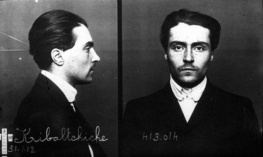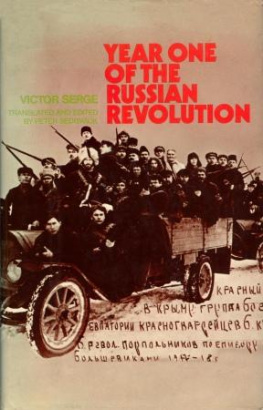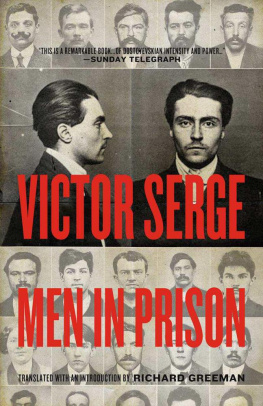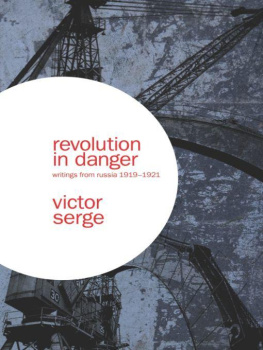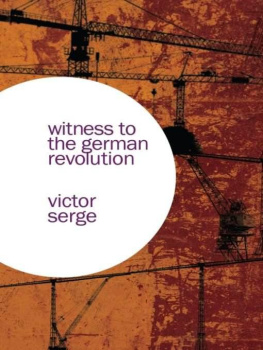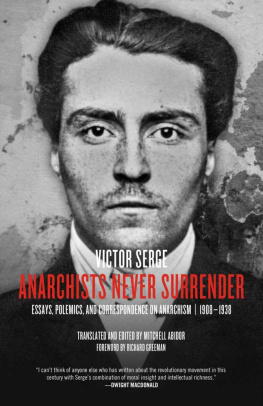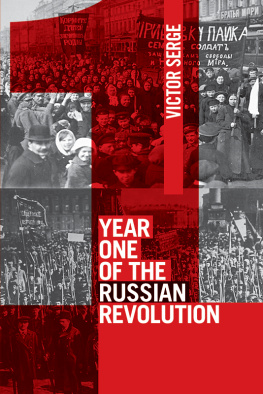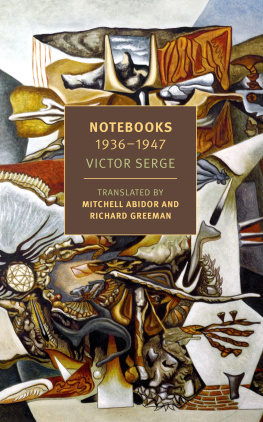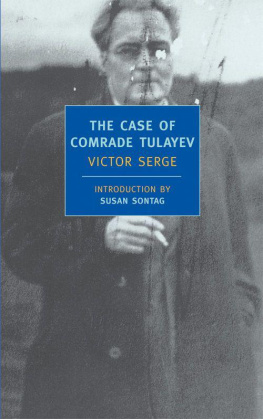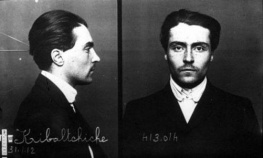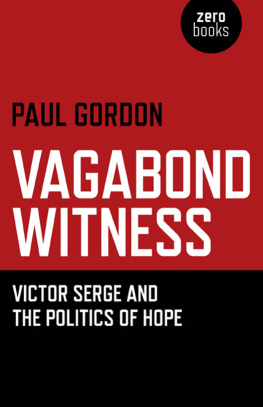Victor Serge - Victor Serge: Repression (1926)
Here you can read online Victor Serge - Victor Serge: Repression (1926) full text of the book (entire story) in english for free. Download pdf and epub, get meaning, cover and reviews about this ebook. year: 2012, genre: Detective and thriller. Description of the work, (preface) as well as reviews are available. Best literature library LitArk.com created for fans of good reading and offers a wide selection of genres:
Romance novel
Science fiction
Adventure
Detective
Science
History
Home and family
Prose
Art
Politics
Computer
Non-fiction
Religion
Business
Children
Humor
Choose a favorite category and find really read worthwhile books. Enjoy immersion in the world of imagination, feel the emotions of the characters or learn something new for yourself, make an fascinating discovery.
- Book:Victor Serge: Repression (1926)
- Author:
- Genre:
- Year:2012
- Rating:4 / 5
- Favourites:Add to favourites
- Your mark:
- 80
- 1
- 2
- 3
- 4
- 5
Victor Serge: Repression (1926): summary, description and annotation
We offer to read an annotation, description, summary or preface (depends on what the author of the book "Victor Serge: Repression (1926)" wrote himself). If you haven't found the necessary information about the book — write in the comments, we will try to find it.
Victor Serge: Repression (1926) — read online for free the complete book (whole text) full work
Below is the text of the book, divided by pages. System saving the place of the last page read, allows you to conveniently read the book "Victor Serge: Repression (1926)" online for free, without having to search again every time where you left off. Put a bookmark, and you can go to the page where you finished reading at any time.
Font size:
Interval:
Bookmark:
First published in 1926 as Les Coulisses dune Sret gnrale. Ce qua tout rvolutionnaire doit savoir de la rpression, Librairie du Travail, Paris (see ).
Part I first published in Bulletin Communiste, November 1921 as Les Mthodes et les Procds de la Police Russe.
Translated from the French by Judith White.
Translation & notes: Copyright New Park Publications Ltd 1979.
Transcribed & marked up by for the Marxists Internet Archive.
This book first appeared in French: |
- in Bulletin Communist, nos. 50, 51 and 52 of November 10, 17 and 24, 1921 on pages 829-836, 858-859 and 877-890, with the title Les Mthodes et les Procds de la Police Russe (The Methods and Procedures of the Russian Police)
I. Special training of the policeman. II. External Surveillance. Tailing. III. An Instruction on the recruitment and service of agents provocateurs. IV. A Monograph on provocation in Moscow (1912). V. Files on agents provocateurs. VI. Psychology of the provocateur. VII. Provocation, a two-edged weapon. VIII. Russian spies abroad. Mail opening. IX. How codes are deciphered. X. Synthesis of information. The diagram method. XI. Scientific study of the revolutionary movement. XII. Protection of the Tsars person. XIII. The cost of an execution. XIV. Conclusion: Why the revolution remains invincible. These 14 sections correspond to the first part of the present volume. They were dated Petrograd, October-November 1920. - published by the Librairie du Travail in its collection Faits et Documents, IV, Paris 1926, entitled Les Coulisses dune Sret gnrale. Ce que tout rvolutionnaire devrait savour sur la rpression (Corridors of the security police. What every revolutionary should know about repression). In 1934, extracts were published in the form of a pamphlet entitled: Les problmes de lillgalit. Simples conseils au militant (Problems of illegality. Simple advice to the revolutionary) in the Faits et Documents collection, XII.
- The French police apparently published a pirate edition in the 1960s (?) ... for the use of their employees.
- published by Franois Maspero, Paris 1970, 1972 and 1977 under the title: Ce que tout rvolutionnaire doit savoir de la rpression.
Jean Rire. Paris, 1978 |
Last updated on 21.3.2004
to the French edition of 1926
With the victory of the Revolution in Russia, there fell into the hands of the revolutionaries the whole mechanism of the most modern, most powerful, most battle-hardened political police, which bad taken shape in over fifty years of bitter struggles against the leaderships of a great people.
An acquaintance with the methods and proceedings of this police force is of immediate practical interest for every revolutionary; for the defence of capitalism everywhere uses the same tools; and moreover all police forces work together and are similar to each other.
The science of revolutionary struggle which the Russians acquired in over half a century of immense effort and sacrifice, will have to be acquired in a much shorter space of time by revolutionaries in countries where action is developing today, in the circumstances created by the war, by the victory of the Russian proletariat and the defeats of the international proletariat the crisis of world capitalism, the birth of the Communist International, the marked development of class consciousness among the bourgeoisie, with fascism, military dictatorship, white tenor and anti-working class laws; revolutionaries need this knowledge today. If they are given good warning of the means the enemy has at its disposal, they will perhaps suffer fewer losses ... There is then good reason, for a practical purpose, to study the main instrument of all reaction and all repression, that is, the apparatus for strangling all healthy revolt known as the police. We are able to do so, because the weapon perfected by the Russian autocracy to defend its existence the Okhrana (Defensive), the general security police of the Russian Empire has fallen into our hands.
To make the most thorough study, which would be very useful, would require leisure which the author of these lines does not possess. The pages you are about to read do not make any claim to fulfil this task. They will, I hope, be adequate to give comrades a warning and to enable them to see an important truth which struck me on my very first visit to the archives of the Russian police; which is that there is no force in the world which can hold back the revolutionary tide when it rises, and that all police forces, however Machiavellian, scientific or criminal, are virtually impotent against it.
This work, published for the first time by the Bulletin communiste in November 1921, has been carefully completed. The practical and theoretical questions which a study of the workings of such a police force cannot fail to raise in the mind of a worker reading it, are examined in two new sections. In the section Simple advice to revolutionaries, which despite its obvious simplicity experience shows to be very useful, outline the fundamental rules of workers defence against surveillance, informing and provocation.
Since the war and the October Revolution, the working class can no longer be content with carrying out solely negative, destructive tasks. The epoch of civil wars has begun. Whether they are in fact posed today or not for some years, the many questions of the seizure of power are still here today for most Communist Parties. At the beginning of 1923, capitalist order in Europe might have appeared sufficiently stable to discourage the impatient. By the end of the year, however, the peaceful occupation of the Ruin was to raise over Germany the powerfully real spectre of revolution.
Now, all action aimed at the destruction of capitalist institutions needs to be complemented by the preparation, at least in theory, of the creative work of tomorrow. The urge to destroy, Bakunin used to say, is also the creative urge. This profound thought, which when taken literally has sent many revolutionaries astray, has just become practical reality. The same class struggle outlook today leads communists to destroy and create at the same time. Just as anti-militarism today needs to be complemented by the preparation of the Red Army, the problem of repression posed by the police and bourgeois justice has a positive side of great importance. I believe it is necessary to define the main lines of it. We must get to know the means the enemy has at his disposal; we must also get to know the full extent of our own tasks.
V.S.
March 1925
The publishers wish to thank both Vlady Kibalchich, Victor Serges son, and the publishers Francois Maspero of Paris, for permission to bring out this English edition; M. Jean Rire for compiling material for the appendix , and Peter Sedgwick for valuable advice concerning the translation.
This material is included in the biographical and bibliographical notes, which are accessible from the main Victor Serge index page.
(Part 1)
The Okhrana took over in 1881 from the notorious Third Section of the Ministry of the Interior. But it only really developed after 1900, when a new generation of police was put in charge. The old officers of the constabulary, in particular the higher ranks, had considered it contrary to military honour to occupy themselves with certain aspects of police business. The new school overrode such scruples, and undertook to organise the secret police on a scientific basis, to carry out provocation, informing and betrayal inside the revolutionary parties. It was to produce talented, erudite men like the Colonel Spiridovich who has left us a voluminous
Font size:
Interval:
Bookmark:
Similar books «Victor Serge: Repression (1926)»
Look at similar books to Victor Serge: Repression (1926). We have selected literature similar in name and meaning in the hope of providing readers with more options to find new, interesting, not yet read works.
Discussion, reviews of the book Victor Serge: Repression (1926) and just readers' own opinions. Leave your comments, write what you think about the work, its meaning or the main characters. Specify what exactly you liked and what you didn't like, and why you think so.

